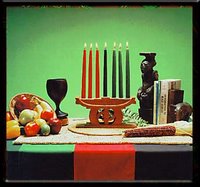"Happy Kwanzaa!"
 "Soul is extra-scientific, that is to say, outside of science; therefore we will allow no scientific disproof of it" _Dr. Maulana Karenga
"Soul is extra-scientific, that is to say, outside of science; therefore we will allow no scientific disproof of it" _Dr. Maulana Karenga
During the holiday season, millions of African American families choose to celebrate Kwanzaa, which begins the first day after Christmas and lasts until New Year's Day. During each of these (seven) days a new principle based in African - American pride, community and heritage is practiced. Kwanzaa was created in 1966 by Dr. Maulana Karenga, a young visionary on the West coast who was also the founder and chairman of the Black Nationalist Organization.
a young visionary on the West coast who was also the founder and chairman of the Black Nationalist Organization.
The word "kwanzaa" is derived from the Swahili word "kwanza" which means first fruits, and as a holiday comes directly out of the tradition of the agricultural people of Africa.
They celebrate and give thanks for harvest at designated times during the year. Each tribe of the community comes together to sing, dance, eat and drink celebrating the harvest of the first fruits and vegetables. Dr. Karenga adopted these celebrations as a symbol of the unity in the souls of black folks.
The holiday's daily ritual begins with the lighting of one of the seven candles placed in the center of a candleholder called a "Kinara" (kee-nah-rah). The first candle is black and is symbolic of "unity" followed by the lighting of red and green candles each day of each principle - three red on the left, and three green on the right.
The principles are:
Umoja (oo-moh-jah) - Unity
Kujichagulia (koo-ji-chah-goo-lee-ah) - Self Determination
Ujima (oo-jee-mah) - Collective Work and Responsibility
Ujamma (oo-jah-mah) - Cooperative Economics
Nia (nee-ah) - Purpose
Kuumba (koo-oom-bah) - Creativity
Imani (ee-mah-nee) - Faith
"The task, as Us percieved it then and contends now, is to forge and embrace a culture that both prepares the people for struggle and sustains them in the process of the struggle for a world of human freedom and human flourishing. This meant then and continues to mean selecting and stressing elements of Black culture that represents the best of African and Human values, values which protect and promote human life, human freedom and maximum human development."
_Dr. Maulana Karenga
"The foods of Kwanzaa are a celebration of the foods of the earth. Do not be absent of taste when trying them, or rush past the experience of ingesting the wonderful bounty the earth has provided. Eat intently and embarrassingly passionately. Taste and enjoy the earth's food, she is the mother that suckles you." - Chef Eric Austin

Chef E's Roasted Butternut Squash Soup
1 Medium to large Butternut Squash
Olive oil
1 cup vegetale stock
1/2 cup heavy cream (optional) *soy milk to finish may be substituted
Salt (Kosher) to taste
Black pepper to taste
1/2 teaspoon granulated garlic/ garlic powder
1/2 teaspoon vanilla extract
1/2 cup green onion (green part only) finely chopped
1 tomato (small dice)

Step 1: Peel the squash and cut in half lengthwise then using a spoon scrape out the inner seeds. Place the pieces in a casserole dish that will fit both halves. Rub the squash liberally with olive oil, then season with salt, pepper and garlic. Place in a 400 degree F oven until flesh is very tender about 20 minutes.
Step 2: Once the squash has cooled slightly, place the pieces in a food processor and add the vegetable stock and process until the soup is very smooth.
Step 3: Transfer to a soup pot and finish simmering on low heat to warm completely through (do not bring to a boil) add the cream or *soy milk (careful that the soy milk does not break) then the tomatoes, green onions, and vanilla extract.
I like to finish the soup with some of the tomato and green onion as a garnish and a drizzle of olive oil. Then drizzle some of the olive oil on spears of baguette and a tapanade of olives on toasted crostini.
"A luta continua" (the struggle continues)
SAY IT LOUD!
 "Soul is extra-scientific, that is to say, outside of science; therefore we will allow no scientific disproof of it" _Dr. Maulana Karenga
"Soul is extra-scientific, that is to say, outside of science; therefore we will allow no scientific disproof of it" _Dr. Maulana KarengaDuring the holiday season, millions of African American families choose to celebrate Kwanzaa, which begins the first day after Christmas and lasts until New Year's Day. During each of these (seven) days a new principle based in African - American pride, community and heritage is practiced. Kwanzaa was created in 1966 by Dr. Maulana Karenga,
 a young visionary on the West coast who was also the founder and chairman of the Black Nationalist Organization.
a young visionary on the West coast who was also the founder and chairman of the Black Nationalist Organization.The word "kwanzaa" is derived from the Swahili word "kwanza" which means first fruits, and as a holiday comes directly out of the tradition of the agricultural people of Africa.
They celebrate and give thanks for harvest at designated times during the year. Each tribe of the community comes together to sing, dance, eat and drink celebrating the harvest of the first fruits and vegetables. Dr. Karenga adopted these celebrations as a symbol of the unity in the souls of black folks.

The holiday's daily ritual begins with the lighting of one of the seven candles placed in the center of a candleholder called a "Kinara" (kee-nah-rah). The first candle is black and is symbolic of "unity" followed by the lighting of red and green candles each day of each principle - three red on the left, and three green on the right.
The principles are:
Umoja (oo-moh-jah) - Unity
Kujichagulia (koo-ji-chah-goo-lee-ah) - Self Determination
Ujima (oo-jee-mah) - Collective Work and Responsibility
Ujamma (oo-jah-mah) - Cooperative Economics
Nia (nee-ah) - Purpose
Kuumba (koo-oom-bah) - Creativity
Imani (ee-mah-nee) - Faith
"The task, as Us percieved it then and contends now, is to forge and embrace a culture that both prepares the people for struggle and sustains them in the process of the struggle for a world of human freedom and human flourishing. This meant then and continues to mean selecting and stressing elements of Black culture that represents the best of African and Human values, values which protect and promote human life, human freedom and maximum human development."
_Dr. Maulana Karenga
"The foods of Kwanzaa are a celebration of the foods of the earth. Do not be absent of taste when trying them, or rush past the experience of ingesting the wonderful bounty the earth has provided. Eat intently and embarrassingly passionately. Taste and enjoy the earth's food, she is the mother that suckles you." - Chef Eric Austin

Chef E's Roasted Butternut Squash Soup
1 Medium to large Butternut Squash
Olive oil
1 cup vegetale stock
1/2 cup heavy cream (optional) *soy milk to finish may be substituted
Salt (Kosher) to taste
Black pepper to taste
1/2 teaspoon granulated garlic/ garlic powder
1/2 teaspoon vanilla extract
1/2 cup green onion (green part only) finely chopped
1 tomato (small dice)

Step 1: Peel the squash and cut in half lengthwise then using a spoon scrape out the inner seeds. Place the pieces in a casserole dish that will fit both halves. Rub the squash liberally with olive oil, then season with salt, pepper and garlic. Place in a 400 degree F oven until flesh is very tender about 20 minutes.
Step 2: Once the squash has cooled slightly, place the pieces in a food processor and add the vegetable stock and process until the soup is very smooth.
Step 3: Transfer to a soup pot and finish simmering on low heat to warm completely through (do not bring to a boil) add the cream or *soy milk (careful that the soy milk does not break) then the tomatoes, green onions, and vanilla extract.
I like to finish the soup with some of the tomato and green onion as a garnish and a drizzle of olive oil. Then drizzle some of the olive oil on spears of baguette and a tapanade of olives on toasted crostini.
"A luta continua" (the struggle continues)
SAY IT LOUD!



0 Comments:
Post a Comment
<< Home